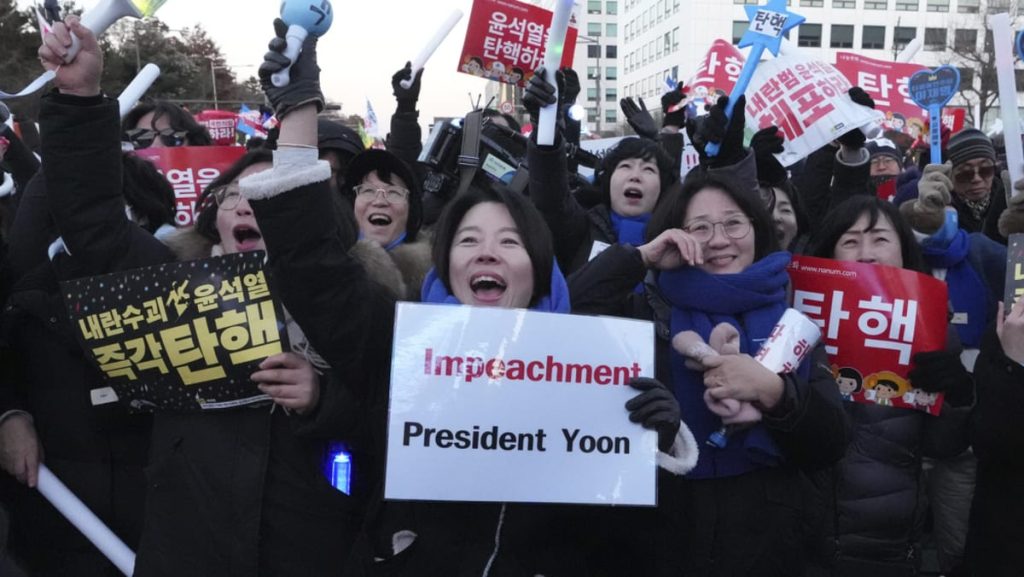The political landscape of South Korea is currently embroiled in a tumultuous power struggle, with President Yoon Suk-yeol facing unprecedented public disapproval and potential impeachment following his controversial declaration of martial law. Yoon’s approval rating has plummeted to a historic low of 11%, a clear indication of the widespread public discontent with his leadership. This dramatic drop in popularity stems from his contentious decision to impose martial law, a move that triggered massive protests across the country, with thousands of demonstrators converging on the capital to express their outrage. This crisis echoes the impeachment of former President Park Geun-hye, yet Yoon’s situation presents a unique set of circumstances and potential outcomes.
While Yoon’s public support is undeniably precarious, it remains notably higher than Park’s was during her impeachment proceedings. Furthermore, Yoon enjoys significantly stronger backing within his own party, a crucial factor that distinguishes his predicament from Park’s, who witnessed a mass exodus of support within her party. More than half of the lawmakers in Park’s party abandoned her, illustrating the deep fissures within her political base. In contrast, Yoon’s party has largely remained steadfast in their support, although this loyalty could be tested as the political fallout from the martial law declaration continues to unfold. This intra-party support provides Yoon with a critical lifeline as he navigates the impeachment process and the turbulent political waters ahead.
The fate of Yoon’s presidency hinges on the upcoming decision of the Constitutional Court. If a sufficient number of justices vote in his favor, he will be reinstated and permitted to complete his five-year term. However, such an outcome, while technically legal, would likely be perceived by a significant portion of the population and parliament as a blatant disregard for the public will. This perception of illegitimacy, even in the face of a legal victory, would undoubtedly further inflame tensions and deepen the political divide. Experts predict that the opposition would likely initiate another impeachment process, perpetuating the cycle of political instability and creating a prolonged period of uncertainty.
The ramifications of Yoon’s martial law declaration extend far beyond the immediate political crisis. Legal scholars argue that the move’s legal justification is extremely weak, creating a significant hurdle for Yoon’s defense. Professor Hong Ji Yeon, a Korean studies expert at the University of Michigan, emphasizes the enormity of the political and legal consequences. Professor Hong contends that the legal basis for the martial law declaration is so tenuous that it would be virtually impossible for any legal expert to mount a successful defense on Yoon’s behalf. This precarious legal standing further complicates Yoon’s political future, even if he manages to survive the current impeachment attempt.
Yoon’s defiant stance, coupled with the deep divisions within the country, suggests that a swift resolution to this political impasse is highly unlikely. The ongoing tension between the executive and legislative branches, combined with the widespread public discontent, points towards a protracted period of political instability. Professor Hong anticipates a prolonged period of turbulence, with further clashes within the National Assembly and ongoing political upheaval throughout South Korea. The martial law declaration has opened a Pandora’s Box of political and legal challenges, setting the stage for a prolonged period of uncertainty and potential further escalation. The ramifications of this crisis will reverberate throughout South Korean politics for the foreseeable future.
The situation in South Korea underscores the fragility of democratic institutions and the crucial role of public trust in maintaining political stability. Yoon’s actions have eroded public confidence in his leadership, created deep divisions within society, and raised serious questions about the future direction of the country. The ongoing political drama highlights the challenges faced by democracies in balancing the need for decisive action with the imperative to respect the rule of law and the will of the people. The coming months will be crucial in determining whether South Korea can navigate this crisis and emerge with its democratic institutions intact.

